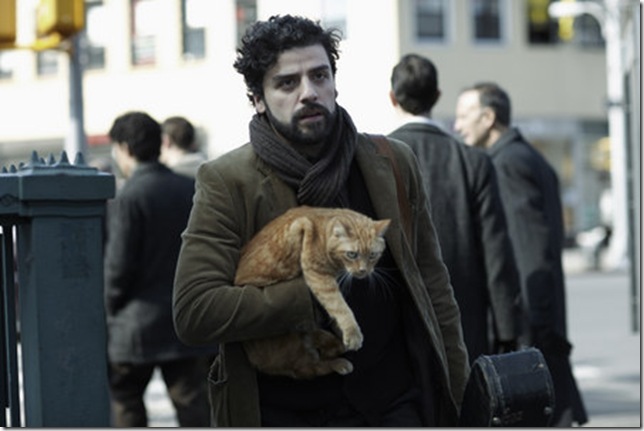I imagine the reason Inside Llewyn Davis has gotten more critical buzz than any Coen Brothers picture in recent memory is because it’s pure, distilled Coens.
It doesn’t have the commercial concessions of a Ladykillers or a True Grit or even a Fargo. It’s not the “fun” Coens of The Big Lebowski or O Brother, Where Are Thou?
This is the Coen Brothers of Barton Fink and A Serious Man, the auteurs of the disenfranchised anti-hero, capturing everyday traumas as he drifts through the surrealist nightmare of Life. Laughs come, occasionally, but the movie’s aftertaste is bitter and hopeless. I didn’t love it when I exited the preview screening, but the more I think about it, the more it lingers, hauntingly, like the residual melodies of one of its title character’s spartan songs.
Loosely based on the memoir of Dave Van Ronk, a cult figure from the Greenwich Village folk scene of the early ’60s, the Coens’ guitar-strumming misanthrope, Llewyn Davis (Oscar Isaac) lives the troubadour idyll. It’s 1961, and when he isn’t playing the Gaslight or snagging the occasional bit of session work, he couch-surfs at the ridiculously cramped (and, for many in the audience, nostalgically remembered) walk-ups of friends who either admire or pity him.
We get the impression that Llewyn is reaching the end of a rope that has been losing its tether since the suicide of his former recording partner, with whom he released a fondly remembered LP. His solo career has failed to take off; his agent is worthless; he may have accidentally impregnated a colleague’s girlfriend (Carey Mulligan), who is angrier than a nest of pregnant hornets; and he’s even lost another friend’s cat while crashing at their apartment.
In the film’s opening scene, he is viciously attacked by a shadowy figure in a back alley behind the Gaslight, for reasons that only reveal themselves as the movie wends toward a piteous climax. And, like poor Larry Gopnik from A Serious Man, things only seem to get worse.
The Coens’ screenplay is a seemingly aimless meander that mirrors the daily life of its protagonist; we painfully observe as he misses one opportunity for change after another, never taking any action that might lift him from the margins of his niche — musically, socially or personally. And, like a directionless drifter, the script yields a few narrative surprises, not all of them to the film’s benefit.
The middle of the picture is taken up by a strange detour to Chicago, in which Llewyn hitches a ride with an obnoxious jazz musician played by John Goodman—who rants about black magic, prods him with two canes, sports a Colonel Sanders goatee and suffers sleep apnea. Though evocatively filmed, this desolate, tonally awkward sidetrack goes nowhere in more ways than one, and feels mostly like an excuse to give Goodman a reason to host Saturday Night Live.
Back in the real world, it’s more of the same for Llewyn, his life a dour feedback loop of leeching off his more successful friends, self-destructing in front of them, and subsequently apologizing for the self-destruction. His music effectively becomes his own Greek chorus, and the movie is never better than when the Coens’ camera settles on his performances.
Isaac’s renditions of traditional folk ballads like Hang Me, Oh Hang Me and Fare Thee Well are so arrestingly intimate you’ll feel like you’re in the Gaslight audience, or the recording session, or the nursing home, where he performs a tune for his silent, wilting father. I wanted to applaud after each performance. This kind of music was fringe-y and cloistered then and it still is now, though it’s easy to see its influence on modern acts like Bon Iver and Fleet Foxes; let’s hope that this movie does for folksingers what O Brother did for bluegrass acts.
But when it’s all said and sung, you may want to slap the talented singer, especially when it’s revealed that he deserved every shocking punch and kick he absorbs in the movie’s prologue, which is also its epilogue. Time doubles back on itself, coming full circle; this is one of the rare movies, like Two-Lane Blacktop, that doesn’t seem to have a beginning or an end.
Such is the case when you’re stuck in this sort of an existential rut, with no past worth recalling and no future to anticipate. You might not enjoy spending nearly two hours with Llewyn Davis, but you’ve got to admire the audacity of the Coens’ structure, which hasn’t felt this liberated or inspired in years, maybe decades.
And even if you hate that, you’ll still be humming the songs.
INSIDE LLEWYN DAVIS. Directors: Joel Coen and Ethan Coen; Cast: Oscar Isaac, Carey Mulligan, Justin Timberlake, John Goodman, Garrett Hedlund, Ethan Phillips; Distributor: CBS Films; Rated: R; Opens Friday at Cinemark Boynton Beach, Cinemark Palace in Boca Raton, Paragon Jupiter, Cinemark Paradise in Davie, AMC Aventura, Regal South Beach, Coral Gables Art Cinema and AMC Sunset Place.
